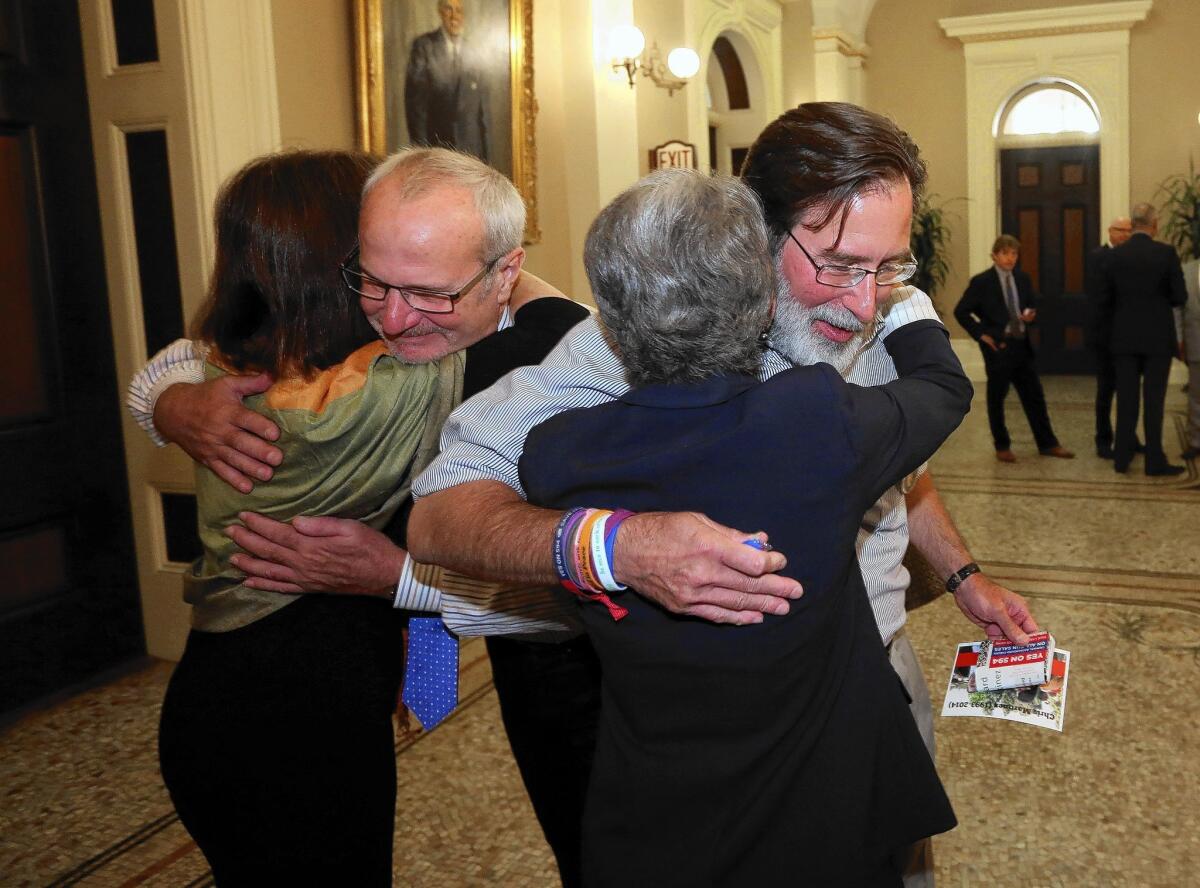Bill requiring warrants for drone use among those OKd by Legislature

- Share via
Reporting from SACRAMENTO — California lawmakers voted Wednesday to require that law enforcement agencies obtain warrants to use drones for surveillance and appeared poised to pass legislation that would allow guns to be confiscated from people declared dangerous.
Assemblyman Jeff Gorell (R-Camarillo) said the expanded use of drones, or unmanned aerial vehicles, by law enforcement has pushed the boundaries of “our reasonable expectation of privacy,” triggering a need for protection.
It’s the Legislature’s duty, he said, to issue “guidelines for government to use these when they’re monitoring human behavior.”
Gorell’s measure would require the government to secure a warrant from a judge before using surveillance drones except in cases of environmental emergencies such as oil or chemical spills. Three other states have placed a moratorium on drone use by state and local agencies. The California bill, AB 1327, heads to the governor.
The bill was backed by the American Civil Liberties Union. Law enforcement groups, however, argued that unmanned surveillance should be treated no differently from manned surveillance.
The measure to allow removal of firearms from people declared to be a threat or mentally unstable was supported by several families who lost loved ones in a violent rampage that left seven people dead near UC Santa Barbara in May.
Under the bill, a law enforcement agency or family member could ask a court for a restraining order that would bar a person thought to be a danger to themselves or others from possessing a firearm for 21 days.
Democratic Assembly members Nancy Skinner of Berkeley and Das Williams of Santa Barbara introduced the legislation, AB 1014. The Isla Vista killer had bought firearms even though his family and others believed he posed such a threat.
“It’s an opportunity to take guns away from people who are in moments of distress,” said Sen. Hannah-Beth Jackson (D-Santa Barbara).
The bill, which passed the Senate on Wednesday, had already passed the Assembly but goes back to that house for approval of final amendments.
Robert Weiss, whose 19-year-old-daughter, Veronika, was shot to death in the May rampage, was in the Senate Gallery on Wednesday to watch the vote and urge lawmakers to support the measure.
“Nothing we can do can bring Veronika and the other victims back, but my hope is by working to pass AB 1014, that other lives will be spared,” Weiss said tearfully at a Capitol news conference.
Lawmakers also voted for more restrictions on Californians who buy guns in other states and bring them home. The measure would require California residents to have those weapons delivered to a dealer in California, where they would be subject to the state’s 10-day waiting period before taking possession. The purchaser also would need a criminal background check and a handgun-safety certificate.
“Every day, people go to Nevada or Arizona, purchase guns, bring them back into California, and sell them to criminals on the streets,” the bill’s author, Assemblyman Luis Alejo (D-Watsonville) said in a letter to fellow lawmakers.
The bill, AB 1609, is supported by California’s attorney general and California Chapters of the Brady Campaign. It passed the Senate on Wednesday but returns to the Assembly for action on amendments.
The measure is opposed by the National Rifle Assn. The California Assn. of Federal Firearms Licensees also objected, saying in a statement that the bill “would create new state law that fails to provide for long standing exemptions in federal law.”
Other measures approved by lawmakers Wednesday, and sent to Brown, include:
•A bill to improve vision screening at elementary schools. The legislation, SB 1172, by Senate President Darrell Steinberg (D-Sacramento), would expand on existing screening for long-distance vision and color blindness by adding screening for nearsightedness in certain grades. The intent is to identify vision problems that impair a child’s ability to read and learn.
A proposal that military veterans suffering post-traumatic stress disorder be allowed to delay their prosecution on misdemeanor charges if they obtain treatment for their problems. Sen. Loni Hancock (D-Berkeley) introduced SB 1227, noting that similar programs for drug abusers have been beneficial.
•A proposal by Assemblyman Phil Ting (D-San Francisco) that would require property-tax agents to register with the secretary of state. It also would establish prohibited practices for such agents — barring them, for example, from making campaign contributions or giving gifts to county officials. The measure, AB 2415, is a response to public corruption charges against Los Angeles County assessor John Noguez, who is on a paid leave of absence and accused of accepting bribes for improperly lowering tax assessments.
•A bill by Assemblyman Richard Bloom (D-Santa Monica) that would take aim at paparazzi by expanding the definition of stalking to include lingering outside a home or workplace without a legitimate purpose. The California Newspaper Publishers Assn. opposed the measure, AB 1356, arguing that it could limit newsgathering.
•Resolution ACR 168 by Alejo, urging the NFL to change the name of the Washington Redskins football team. The name “is widely recognized as a racial slur and promotes discrimination against Native Americans,” said another lawmaker, Sen. Lou Correa (D-Santa Ana).
More to Read
Sign up for Essential California
The most important California stories and recommendations in your inbox every morning.
You may occasionally receive promotional content from the Los Angeles Times.















